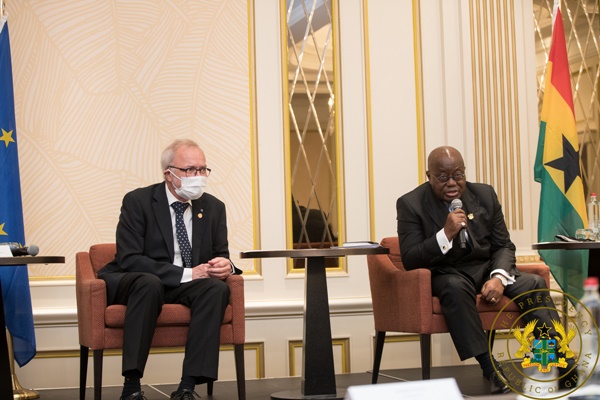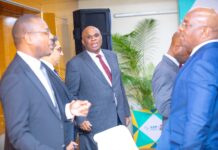- EIB President confirms close relationship with Ghana and shared vision for green transition in Africa
- Largest EIB engagement in Ghana and largest EIB backing for a national bank in Africa
- EIB backing for National Development Bank of Ghana will accelerate economic recovery from COVID-19 and support investment and job creation by thousands of businesses
- National Development Bank to transform long-term business financing in local currency
The Ministry of Finance and the European Investment Bank have signed an agreement for the provision of a one hundred and seventy million euro (€170million) facility for the establishment of a new bank, the Development Bank Ghana (DBG).
The DBG is an integral feature of the GH¢100billion Ghana Cares ‘Obaatampa’ Project, which is seeing to revitalisation of the economy following the onset of COVID-19.
The agreement was signed in Belgium as part of President Nana Addo Dankwa Akufo-Addo’s official visit to the country.
President of the European Investment Bank, Dr. Werner Hoyer who was present at the short signing ceremony, said the €170million facility is the largest facility provided by the European Investment Bank for the establishment of a development bank in Africa – or for any other project, for that matter, on the continent.
Speaking at the signing ceremony, President Akufo-Addo noted: “The Development Bank Ghana is going to play a very important part in the rapid economic transformation of Ghana following the onset of COVID-19”.
According to him, “We want to restructure the economy, and move it from being a mere producer and exporter of raw materials to one that places much greater emphasis on value addition activities. We see this bank (DBG) as one that will play a pivotal role in this”.
The president indicated that the design and operation of the bank, “which has been on the drawing board for the last two years”, will satisfy the highest standards, scrutiny and best practices of Development Banks across the world – assuring further that the €170million facility from the EIB will be used in the purposes for which it was sought.
President Akufo-Addo reiterated that the provision of this facility signals the determination of Ghana to continue partnering the EU, with the president informing Dr. Hoyer that Ghana will fall on the EIB to continue financing other projects in the pipeline as the country works to recover from the impact of COVID-19.
The Deputy Minister of Finance-designate, Charles Adu Boahen who was also present at the signing ceremony, explained that the focus of government since the onset of COVID-19 has been to put in place the building blocks for an inclusive and sustainable economic recovery.
“With the overall objective of creating a favourable environment to spur private sector-led growth, the government of Ghana recognises the importance of a substantial allocation of development capital to critical economic sectors at sustainable interest rates and longer tenures. Accordingly, there has been a heightened need to establish the Development Bank Ghana,” he said.
He stressed that the Development Bank Ghana will be a central player for Ghana’s economic recovery and structural transformation, “especially given the importance of counter-cyclical support in stimulating private enterprise”.
Dr. Hoyer, on his part, was confident that the establishment of Development Bank Ghana will help unlock opportunities for growth in Ghana, as well as assist in rapid recovery of the Ghanaian economy from the ravages of COVID-19.
He noted that establishment of the bank is in line with the objectives of the European Union, and will help develop Ghana’s private sector, agri-business, manufacturing and ICT initiatives.
While describing the decision to establish DBG as “a wise one”, the EIB President added that the Bank sees the partnership with Ghana as a fruitful one, indicating that the EIB will follow keenly the development and workings of DBG in Ghana.
Supporting green power in Ghana
Construction of the original Kpong Dam in 1976 to harness power from the Volta River was the first energy project in Ghana financed by the European Investment Bank. The EIB is now providing €12.5million for renovation of the Kpong Dam, alongside the French Development Agency, AFD.
The renovated plant will be more efficient, reliable and safe, as well as saving an estimated 400,000 tonnes of carbon dioxide emissions a year by contributing 1000 GWh of low-cost hydro energy a year to the national grid.
Building on 45 years of EIB engagement in Ghana
Over the last 45 years, the European Investment Bank has provided more than €626million for investment by entrepreneurs, agriculture, industry and energy across Ghana.
The EIB is the world’s largest international public bank, and last year provided €5 billion for public and private investment across Africa supported by nine regional offices across the continent










